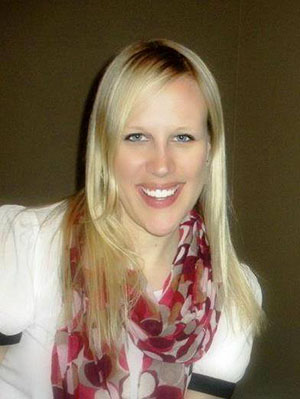Hollie Nyseth Brehm, 27, Sociology
Anyone who’s concerned about genocide should be glad that Hollie Nyseth Brehm is allergic to dust.
As a child, Brehm wanted to be an archeologist. She went on “expeditions” in her sandbox by burying artifacts and pretending to find them. Then she found out about her dust allergy, she says, “which gradually was enough to move me in other directions.”
Today, Brehm researches mass murder. “While many people believe that genocide is unpredictable, I study how it is actually patterned,” she says. “I am creating models to better understand the factors that influence why, when, and how genocide occurs.”
(Photo: Hollie Nyseth Brehm)

Brehm hails from Neillsville, Wisconsin, which she describes as “a small town that is home to the world’s largest talking cow, Chatty Belle, as well as the world’s largest fake block of cheese.”
During her sophomore year at the University of Wisconsin-La Crosse, she took a sociology class taught by Enilda Delgado. “While I took the course to fulfill a general education requirement,” she said, “I immediately became hooked by the way sociologists study how we create our world.” (“Many people still don’t know what sociology is or the insights it can bring to critical social problems,” Brehm says.)
After majoring in sociology and political science, Brehm headed to the University of Minnesota for a sociology Ph.D. Her dissertation included an analysis of the preconditions of genocide in every country over the last 50 years.
A professor there, David Pellow, had a particular impact on her: “For any research project he undertakes, he strives to ensure that he is conducting research that matters,” she says. “In other words, he tries to use social science to better the world.”
Brehm graduated from UMN with a 4.0 GPA. Among many other awards, Brehm won two prestigious National Science Foundation prizes. Next year, she’ll be teaching sociology and criminology at Ohio State University.
“I’m motivated by the many wonderful people I met during my dissertation travels to Rwanda and Bosnia-Herzegovina,” she says. In Rwanda, Brehm interned with the government’s genocide prevention commission. She has also conducted case-study interviews in Bosnia and Sudan, and in Chad’s refugee camps for those who fled Darfur. At those camps, Brehm helped build pre-schools and implement educational curricula.
Brehm also co-founded the Heritage Academy of Science and Technology, a Minneapolis school for Somali refugees, and still chairs of its board of directors. So far, the academy has had two graduating classes—every graduating senior has been accepted to at least one college. Brehm is also on the board of directors of Global Solutions Minnesota, a human-rights and anti-war non-profit, and volunteers for I-Activism and the Center for Victims of Torture, groups that help people affected by mass atrocity.
During the 20th century, genocide was responsible for more deaths than murder, homicide, and manslaughter combined. “After millions were killed during the Nazi Holocaust,” Brehm says, “the international community vowed to prevent genocide from occurring in the future. Yet genocide continues to happen with tragic frequency.”
Brehm’s work suggests that genocide can be predicted and maybe even prevented. “I hope to help build the sociology of genocide into an established research paradigm,” she says. “I also hope to serve as the U.N. Special Adviser for the Prevention of Genocide.” She already works with Rwanda’s National Commission for the Fight Against Genocide to study the gacaca courts, the ones that convicted those guilty of ethnically motivated violence.
Though she’s not digging for artifacts as she’d originally hoped, Brehm is satisfied with her career trajectory so far. “Sociology and archeology each seek to better understand the social world,” she says, “so I like to think I held on to the dream in some way.”
See our complete 2014 list of the 30 top thinkers under 30 here.





